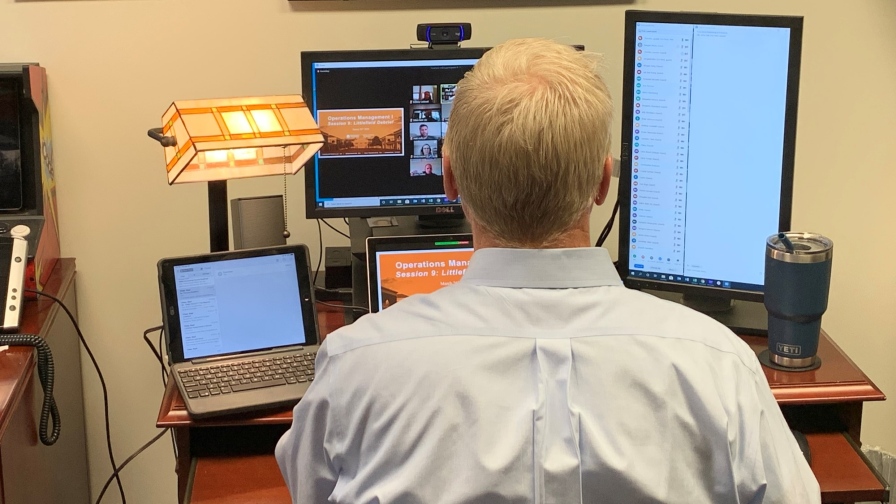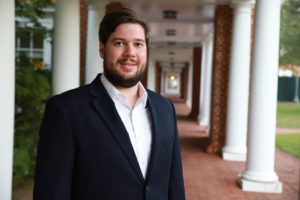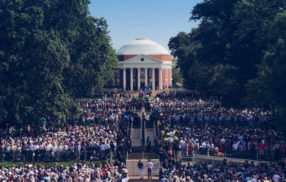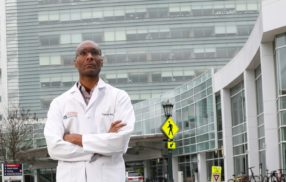
View From the Other Side of the Screen: UVA Darden Students Weigh-in on Distance Learning, Uncertain Future and a Spring Like No Other
By Sam Werner (Class of 2020)
In a lot of ways, Michaela Banks’ Match Day celebration was going to be what she had always expected.
Banks, a Second Year University of Virginia Darden School of Business student pursuing a joint MD/MBA degree, was going to find out on 20 March where she would be spending the next few years for her medical residency. She was in Charlottesville, ready to celebrate with friends and family.
But in many, many more ways, it was in no way what Banks had pictured.
Rather than in a massive auditorium, Banks was at home in her apartment. And instead of celebrating with other graduating medical students in person, she was on a Zoom video call with about two dozen of her Darden classmates.

Sam Werner (Class of 2020) authored this article on the student experience at Darden during the coronavirus pandemic.
As with the rest of the world, life at Darden has changed drastically since early March due to the COVID-19 pandemic. Classes have moved online, social events are conducted via Zoom and students are anxious about the new uncertainty surrounding their job and internship searches. Students are also split between the majority that remain in Charlottesville and those who are now elsewhere around the world.
But the challenge of “Darden at a Distance” has also allowed the School to show off some of its best attributes: the passion faculty and staff have for the student experience, the amount of care students have for each other and the resourcefulness of the community as a whole.
So when Banks adjusted her plan and sent out a Zoom link to about 25 Darden friends, it wasn’t really a surprise that all of them logged on 15 minutes before noon, when she was supposed to receive an email with her match results. After several months of interviews, her top choice was emergency medicine at LSU-New Orleans, a location and specialty directly confronting the COVID-19 crisis.
At 11:58 a.m., two minutes early, Banks saw the “(1)” pop up on her Gmail account, indicating a new email. She and the rest of the virtual room held their breath.
***
The realization that the School’s fourth quarter would be unlike any Darden had seen before came through a series of emails in mid-March. On 11 March, the University announced that classes would be moved online until at least 5 April and any events with more than 100 people had been cancelled. Less than a week later, on 17 March, students received word that the rest of the semester would be conducted online. All gatherings — regardless of size — had been cancelled. Perhaps most significantly, UVA Final Exercises would not proceed as planned.
“There’s initially sense of loss,” said Second Year Max Linden, elected by his full-time MBA classmates as one of two student speakers at a Darden graduation event still tentatively in the works. “Especially for a school like Darden. Spring is so beautiful, we work really hard, and you look forward to this last quarter because it’s a celebratory moment after these last two years. We didn’t really get to have that.”
***
Regarding the move to online classes, there was initially some uncertainty among the student body. The classroom environment is, of course, a hallmark of the Darden experience and culture. But there was also the prevailing sentiment that whatever virtual learning would look like, it would not suffer from a lack of thought, care and effort from the Darden faculty and staff.
“The Darden experience isn’t just for students,” Second Year Katharine Watson said. “The faculty and administration have this intense passion for the School and the community. We have very high-quality staff who are passionate about what they do and who they’re doing it for. Making this a positive experience for the students was clearly the number-one priority.”
As the quarter has progressed, students and faculty alike have adapted to the online format. Some professors are more adept than others at utilizing all of Zoom’s different features, and some subject areas lend themselves more to online learning, but students by and large agree that most classes found their footing.
First Year Angus MacIntyre highlighted his “Negotiations” class, taught by Professor Roshni Raveendhran.
“Part of it is the class just lends itself to Zoom, using breakout rooms and everything,” MacIntyre said. “Roshni has done a really good job figuring out how to manage the class discussion, how to use the raise-hand feature, how to call on people in an order that makes sense. Different things are going to work for different classes.”
Zoom classes may feel a bit more lecture-based than the typical case discussion you’d find in a Darden classroom, but professors have also embraced more nontraditional forms of all-valuable class participation. Students who may be reluctant to speak up in class, for instance, might feel more comfortable using chat or message board functions.
“I think [the faculty] has gone all the way to make it a great experience and make it the best they can,” Watson added. “They’re putting their best foot forward, they’re in it with us together. Even if a class isn’t that exciting, you know they’ve done the best they can with it. If a class is exciting, I make sure to thank them for such an awesome class.”
***
While the Darden community has gone to great lengths to adapt the classroom experience to a social distancing world, it obviously has less control over the uncertainty facing the world economy and the fallout from the COVID-19 pandemic.
Some First Year students saw their internship offers rescinded. Only a few job offers were rescinded for Second Years as of early May, but many more were being asked to delay their start dates. In the Executive MBA and Master of Science in business analytics programs, in which students continue full-time work while they earn their degrees, several students in total had been laid off.
But even for students with secure internship and job offers, the lack of clarity about what things will look like in the foreseeable future, or even how long the COVID-19 pandemic will last, is enough to cause anxiety.
MacIntyre rattled off a list of questions he and other First Years have considered as they prepare for their internships, most of which have shifted to a remote, digital format:
“Am I going get a good project? Is my work going to be valuable? Am I going to have an internship? For people who are going to re-recruit, how am I going to tell this story? Are they going to give out full-time offers? Is there going to be a job for me after I graduate?
“I think it’s pretty pervasive across the class, to be honest,” he said. “I don’t know anyone who’s highly comfortable in their role. They have at least one of those worries.”
First Year Alex Goot admitted he’s disappointed his internship with Dell will be done remotely, rather than in the company’s Austin, Texas, headquarters, but is keeping a positive attitude.
“Control what you can control, do the best job you possibly can if your internship is still happening,” Goot said. “All we can do is wait and see what the landscape looks like a year from now.”
International students have to deal with even deeper levels of uncertainty, both from companies tightening their hiring policies and from the U.S. government adjusting immigration policies during the pandemic.
“There’s definitely heightened anxiety around the job market,” Second Year Ragini Bhuyan, a native of India, said. “Even in normal recruiting, international students have a smaller pool of companies they can recruit into.
“We just don’t know what’s going to happen going forward.”
***
For this fourth quarter at Darden, though, some things are certain.
There is no Darden Follies, no Spring Soiree, no Foxfield Races. And, of course, no walking the Lawn at Final Exercises.
Still, Darden has adapted. The Darden Student Association still sends out weekly emails highlighting virtual social events, which students volunteer to host. First Year Nick Talbott has put on a weekly Jeopardy! contest, while classmate Harsha Gummagatta has hosted the “Professor and a Playlist” series, where he talks with a member of the Darden faculty about their favorite songs and musical artists.
“We just started thinking ‘What can we do that’s digital?’” said Linden, who completed his term as president of the Darden Student Association (DSA) in April. “For events already scheduled, how do we do those things differently, so people don’t feel like everything ended, but it’s still safe and responsible?”
This year’s Darden Cup, for instance, still proceeded with a virtual final event. Students, partners and faculty downloaded a fitness app and tracked their workouts, with points awarded for number of activities, miles covered, time spent and more. All together, 438 people logged nearly 2,430 activities, covering 2,174 hours, 10,496 miles and 556,861 feet of elevation. Section E won the event, but Section A ended up claiming the 2020 Darden Cup.
But for as admirable a job the DSA and Darden students have done with building out online social calendars, there are just some things that couldn’t be replaced.
“Initially, I was sad about the big stuff, things like Foxfield,” MacIntyre said. “Now I don’t necessarily think about that stuff. I’m thinking about the random interactions I have with people, passing them in the hallway, catching up after class.”
***
Banks pulled up her phone to read the email while staying on the video chat. As she started to read, she could barely get the words “Emergency Medicine, LSU-New Orleans” out of her mouth before being drowned out by screams and cheers from friends around the world.
“I found out I matched at my number-one choice with a group of friends watching me,” Banks said. “It was really special and really powerful.
“I definitely think it was better [than a normal ceremony]. I think it was a lot more special. I was able to feel supported, be with people I knew really well, and share those emotions with them.”
While Banks will be directly confronting the COVID-19 crisis when she starts her residency in June, the entire Darden Class of 2020 will be reckoning with their unusual final quarter of business school and re-entering the workforce at an incredibly uncertain time. This experience will, almost undoubtedly, shift some perspectives as the Class of 2020 begins their post-Darden careers.
“I think it makes you a little bit more thankful for when you do have opportunities,” Second Year Jade Palomino said. “I think it forces you to be more purposeful and forceful about what you really want. When you have to explore alternatives, you have to think about why you’re doing it. Is this what I really want?”
Being socially distant for this quarter will also make the class’ first in-person reunion — whether it’s in the fall, next summer or further out than that — all the more special. It may be impossible to completely make up for the time and experiences lost, but the ability to catch up and reconnect in person, eventually, will still be an important capstone on the Class of 2020’s time at Darden.
“I’m going to take an optimist perspective, and I think it’ll bring us closer together,” Palomino said. “Any time people go through adversity, it allows you to connect. It might be over something difficult, but it brings out the best in people.”
***
Batten Media Fellow Sam Werner is a student in Darden’s full-time MBA Class of 2020. Prior to Darden, he served as a sports reporter with the Pittsburgh Post-Gazette for seven years, covering college football and the NHL. After graduating in May, he will join Sports Media Advisors, a boutique sports media and technology consulting firm based on New Canaan, Connecticut.
Landmark Communications Founder Frank Batten established the Batten Media Fellowships in 1988 to give men and women committed to a career in the media the opportunity to develop the skills needed to lead and manage a successful media enterprise by pursuing an MBA at the Darden School. The fellowships cover tuition and fees for both years of the MBA program.
The University of Virginia Darden School of Business prepares responsible global leaders through unparalleled transformational learning experiences. Darden’s graduate degree programs (MBA, MSBA and Ph.D.) and Executive Education & Lifelong Learning programs offered by the Darden School Foundation set the stage for a lifetime of career advancement and impact. Darden’s top-ranked faculty, renowned for teaching excellence, inspires and shapes modern business leadership worldwide through research, thought leadership and business publishing. Darden has Grounds in Charlottesville, Virginia, and the Washington, D.C., area and a global community that includes 18,000 alumni in 90 countries. Darden was established in 1955 at the University of Virginia, a top public university founded by Thomas Jefferson in 1819 in Charlottesville, Virginia.
Press Contact
Molly Mitchell
Senior Associate Director, Editorial and Media Relations
Darden School of Business
University of Virginia
MitchellM@darden.virginia.edu







